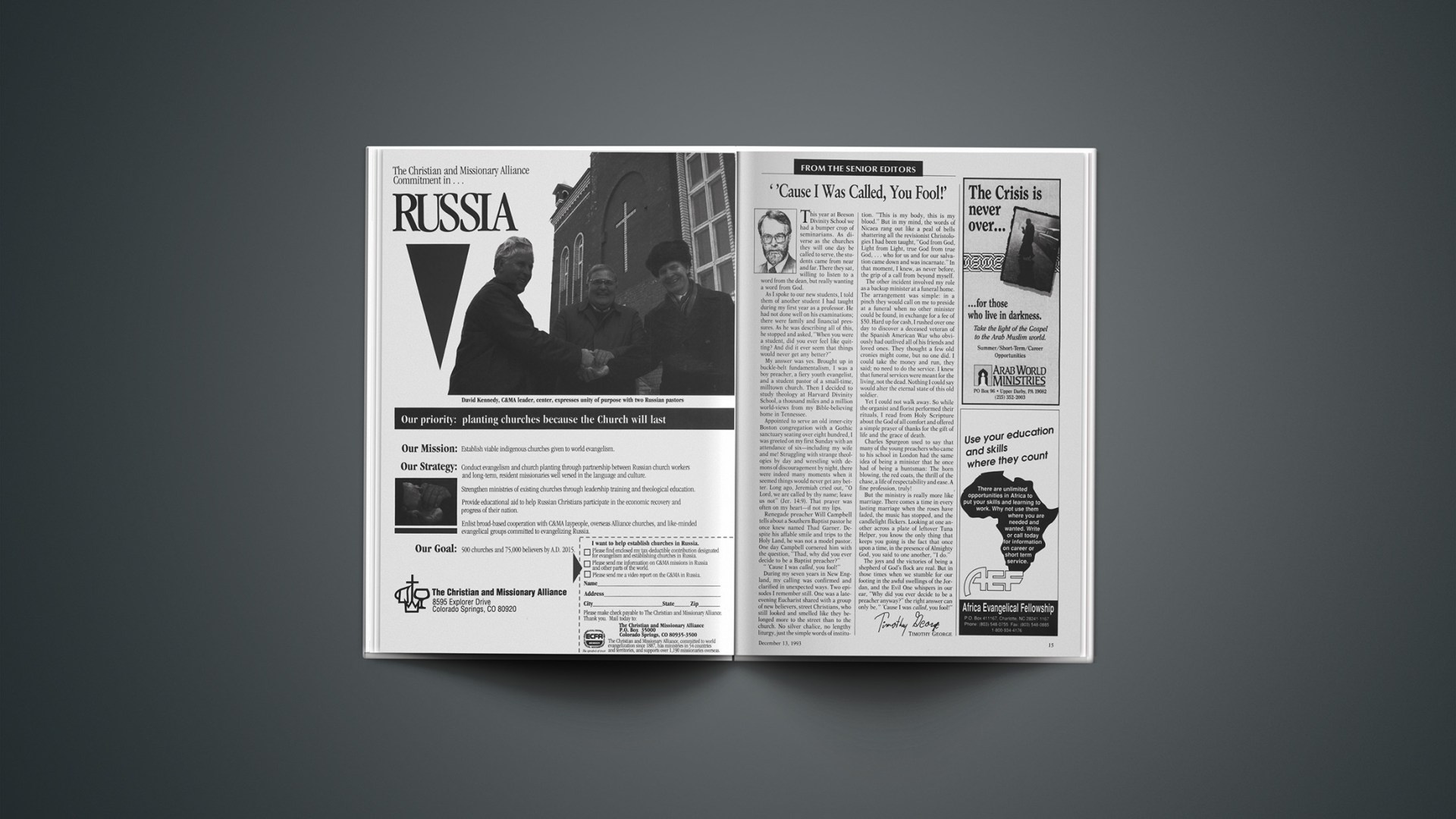This year at Beeson Divinity School we had a bumper crop of seminarians. As diverse as the churches they will one day be called to serve, the students came from near and far. There they sat, willing to listen to a word from the dean, but really wanting a word from God.
As I spoke to our new students, I told them of another student I had taught during my first year as a professor. He had not done well on his examinations; there were family and financial pressures. As he was describing all of this, he stopped and asked, “When you were a student, did you ever feel like quitting? And did it ever seem that things would never get any better?”
My answer was yes. Brought up in buckle-belt fundamentalism, I was a boy preacher, a fiery youth evangelist, and a student pastor of a small-time, milltown church. Then I decided to study theology at Harvard Divinity School, a thousand miles and a million world-views from my Bible-believing home in Tennessee.
Appointed to serve an old inner-city Boston congregation with a Gothic sanctuary seating over eight hundred, I was greeted on my first Sunday with an attendance of six—including my wife and me! Struggling with strange theologies by day and wrestling with demons of discouragement by night, there were indeed many moments when it seemed things would never get any better. Long ago, Jeremiah cried out, “O Lord, we are called by thy name; leave us not” (Jer. 14:9). That prayer was often on my heart—if not my lips.
Renegade preacher Will Campbell tells about a Southern Baptist pastor he once knew named Thad Garner. Despite his affable smile and trips to the Holy Land, he was not a model pastor. One day Campbell cornered him with the question, “Thad, why did you ever decide to be a Baptist preacher?”
“ ’Cause I was called, you fool!”
During my seven years in New England, my calling was confirmed and clarified in unexpected ways. Two episodes I remember still. One was a late-evening Eucharist shared with a group of new believers, street Christians, who still looked and smelled like they belonged more to the street than to the church. No silver chalice, no lengthy liturgy, just the simple words of institution. “This is my body, this is my blood.” But in my mind, the words of Nicaea rang out like a peal of bells shattering all the revisionist Christologies I had been taught, “God from God, Light from Light, true God from true God, … who for us and for our salvation came down and was incarnate.” In that moment, I knew, as never before, the grip of a call from beyond myself.
The other incident involved my role as a backup minister at a funeral home. The arrangement was simple: in a pinch they would call on me to preside at a funeral when no other minister could be found, in exchange for a fee of $50. Hard up for cash, I rushed over one day to discover a deceased veteran of the Spanish American War who obviously had outlived all of his friends and loved ones. They thought a few old cronies might come, but no one did. I could take the money and run, they said; no need to do the service. I knew that funeral services were meant for the living, not the dead. Nothing I could say would alter the eternal state of this old soldier.
Yet I could not walk away. So while the organist and florist performed their rituals, I read from Holy Scripture about the God of all comfort and offered a simple prayer of thanks for the gift of life and the grace of death.
Charles Spurgeon used to say that many of the young preachers who came to his school in London had the same idea of being a minister that he once had of being a huntsman: The horn blowing, the red coats, the thrill of the chase, a life of respectability and ease. A fine profession, truly!
But the ministry is really more like marriage. There comes a time in every lasting marriage when the roses have faded, the music has stopped, and the candlelight flickers. Looking at one another across a plate of leftover Tuna Helper, you know the only thing that keeps you going is the fact that once upon a time, in the presence of Almighty God, you said to one another, “I do.”
The joys and the victories of being a shepherd of God’s flock are real. But in those times when we stumble for our footing in the awful swellings of the Jordan, and the Evil One whispers in our ear, “Why did you ever decide to be a preacher anyway?” the right answer can only be, “ ’Cause I was called, you fool!”










